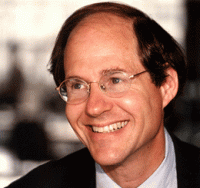 I’m preparing what will become another one of my absurdly long and boring book reviews and this time it’s Tim Wu’s new book — The Master Switch: The Rise and Fall of Information Empires — that will be under the microscope. As with many of the books I review, I’m going to go pretty hard on it, especially since I disagree with Tim on so many fronts. But I appreciate his willingness to engage a kooky libertarian like me and the fact that he shared an early proof of the book with me so I could prepare a review.
I’m preparing what will become another one of my absurdly long and boring book reviews and this time it’s Tim Wu’s new book — The Master Switch: The Rise and Fall of Information Empires — that will be under the microscope. As with many of the books I review, I’m going to go pretty hard on it, especially since I disagree with Tim on so many fronts. But I appreciate his willingness to engage a kooky libertarian like me and the fact that he shared an early proof of the book with me so I could prepare a review.
 Nonetheless, I figured I would pre-empt the pain to come by posting a short comment here about one portion of the book with which I find myself in violent agreement. Chapter 16 of Wu’s book is a short history of cable television and it includes a brief discussion of a favorite theory of many Internet pessimists: the notion that the increased personalization or customization that Internet brings us will lead to a variety of potential ills, including: homogenization, close-mindedness, an online echo-chamber, information overload, or corporate brainwashing. Their greatest fear seems to be that hyper-customization of websites and online technologies will cause extreme social “fragmentation,” “polarization,” “balkanization,” “extremism” and even the supposed decline of deliberative democracy.
Nonetheless, I figured I would pre-empt the pain to come by posting a short comment here about one portion of the book with which I find myself in violent agreement. Chapter 16 of Wu’s book is a short history of cable television and it includes a brief discussion of a favorite theory of many Internet pessimists: the notion that the increased personalization or customization that Internet brings us will lead to a variety of potential ills, including: homogenization, close-mindedness, an online echo-chamber, information overload, or corporate brainwashing. Their greatest fear seems to be that hyper-customization of websites and online technologies will cause extreme social “fragmentation,” “polarization,” “balkanization,” “extremism” and even the supposed decline of deliberative democracy.
These concerns were first given widespread circulation by the prolific University of Chicago law professor Cass Sunstein in his 2001 book Republic.com. In that book, Sunstein raised deep reservations about what Nicholas Negroponte had first called “The Daily Me” of media customization that the Internet and digital communications allows. Sunstein referred to “The Daily Me” in contemptuous terms, saying that the hyper-customization of websites and online technologies was causing extreme social fragmentation and isolation that could lead to political extremism. “A system of limitless individual choices, with respect to communications, is not necessarily in the interest of citizenship and self-government,” he wrote. Sunstein was essentially claiming that the Internet is breeding a dangerous new creature: Anti-Democratic Man. “Group polarization is unquestionably occurring on the Internet,” he proclaimed, and it is weakening what he called the “social glue” that binds society together and provides citizens with a common “group identity.” If that continues unabated, Sunstein argued, the potential result could be nothing short of the death of deliberative democracy and the breakdown of the American system of government.
Other pessimists, like Andrew Keen, go further and claim that “the moral fabric of our society is being unraveled by Web 2.0. It seduces us into acting on or most deviant instincts and allows us to succumb to our most destructive vices. And if is corroding the values we share as a nation.” (Keen, Cult of the Amateur, at 163.) Nick Carr summarizes the views of the pessimists when he says: “it’s clear that two of the hopes most dear to the Internet optimists—that the Web will create a more bountiful culture and that it will promote greater harmony and understanding—should be treated with skepticism. Cultural impoverishment and social fragmentation seem equally likely outcomes.” (Carr, The Big Switch, at 167.)
In sociological literature and the field of media criticism, this concern is sometimes referred to as “the water cooler” or “social campfire” problem. In the critics’ Norman Rockwell-esque interpretation of the age of mass media, we all gathered around the water cooler at work each day, or the proverbial campfire during the weekend, and shared common stories and feelings that we had experienced in newspapers and magazines, or on radio or television. This supposedly created a more tightly-knit national “community” and encouraged greater empathy and social understanding among the citizenry. And this is what is now being decimated by the more personalized, atomistic Internet era, the critics say.
Tim Wu challenges these claims first by noting that “The age of ‘mass media’ upended by cable television was actually a period of unprecedented culture homogeneity.” He continues:
In this sense, cable television’s undoing of the mass, or national, media culture was merely the undoing of a transient twentieth-century invention. In the nineteenth century, as now, there was little common information for any two randomly selected American citizens to discuss, even if there had been a water cooler.
For the purposes of our narrative, the conclusion is clear: an open medium has much to recommend it, but not the power to unify the country. For a fully united national community, nothing succeeds like centralized mass media, a fact not lost on the Fascist and Communist totalitarianisms. With an open medium, one has diversity or fragmentation of content, and with it, differences among groups and individuals are accentuated rather than elided or repressed. (p. 214-15)
Quite right, and Wu could have gone on to make a more cogent point: Isn’t it just as good that we all have something new and unique to discuss around the water cooler each day! I mean, seriously, think about the shallowness of the Sunstein critique for a moment. He and other pessimists are essentially saying that we were better off in an era when, if we all weren’t home sitting in front of our TV sets at exactly 6:30 each night, then we missed our chance to hear the same three old white guys in bad suits tells us what the important news of the day was! Look, I liked Cronkite, Brinkley & Co., but I will take today’s 24/7 news cycle of instantaneous news and information over that old system any day of the week.
And what about that “fragmentation” / “polarization” claim that Sunstein and other pessimists make? Well, last time I checked, mobs weren’t rioting in the streets or rushing out to join the Nazi or Communist parties! Those knuckleheads still exist, of course, but they have always existed. And let’s not forget, as Tim Wu apty noted, it was during the age of scarcity and mass media that those movements gained traction and took control in some countries. In the Internet Age, by contrast, such extremist lunatics usually get exposed and widely ridiculed. As the old saying goes, the answer to bad speech is more speech. The Internet has given us a platform to do so and helped us counter such societal extremism, even if it has simultaneously given such extremists a new soapbox to stand on and spew their hatred and stupidity. Let them spew it and we will respond! And we will marginalize them in the process.
Interestingly, some scholars are starting to take on Sunstein’s fragmentation thesis using more formal statistical methods. A recent study by Matthew Gentzkow and Jesse M. Shapiro of the University of Chicago Booth School of Business found “no evidence that the Internet is becoming more segregated over time” or leading to increased polarization as Sunstein and other pessimists fear. Instead, their findings show that the Net has encouraged more ideological integration and is driving us to experience new, unanticipated viewpoints. As New Your Times columnist David Brooks noted, “This study suggests that Internet users are a bunch of ideological Jack Kerouacs. They’re not burrowing down into comforting nests. They’re cruising far and wide looking for adventure, information, combat and arousal.”
Thus, I agree with Tim Wu that we have reasons to be optimistic about the benefits of the more diverse, heterogeneous world we live in today. Sure, we have lost something in the process. Namely, we’ve lost an abundance of those “mega-moments” in media when 80+ percent of us would gather around the boob tube to watch Elvis or the Beatles on “The Ed Sullivan Show,” or the series finale of “M.A.S.H.” But you know what, I think many of us would have rather been watching or doing something else, anyway. And now we can. We’re not going to become a bunch of knuckle-dragging social neanderthals because we do.

 The Technology Liberation Front is the tech policy blog dedicated to keeping politicians' hands off the 'net and everything else related to technology.
The Technology Liberation Front is the tech policy blog dedicated to keeping politicians' hands off the 'net and everything else related to technology.